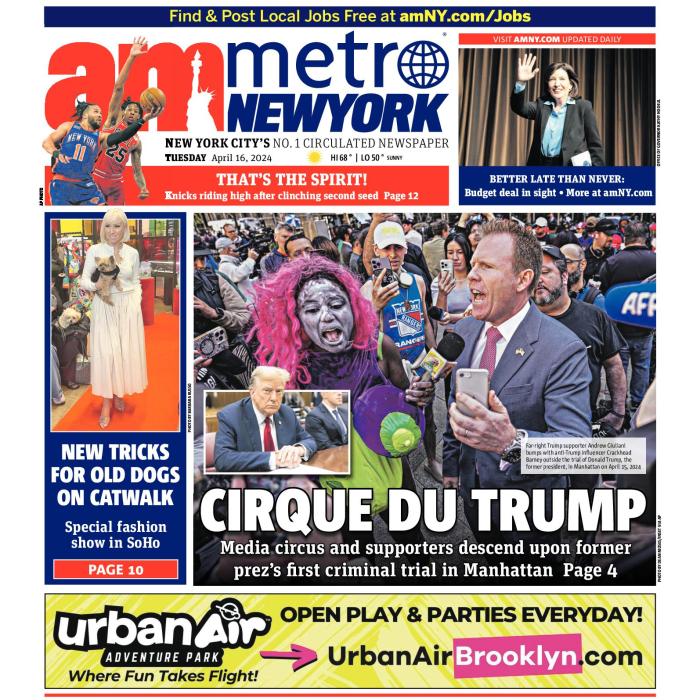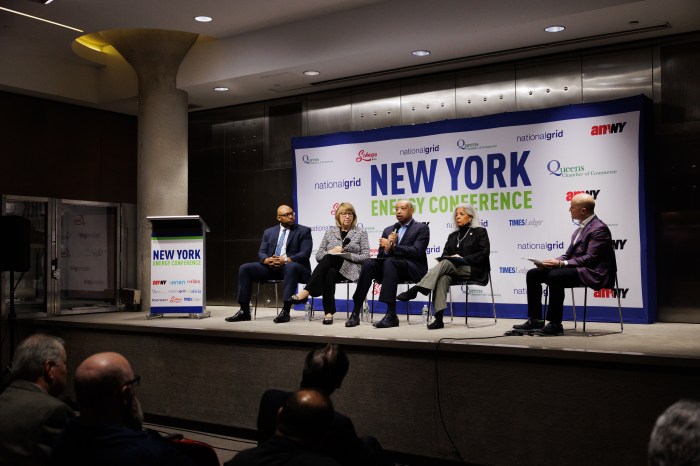
Traveling in our bustling city can evoke a multitude of complaints and frustrations. But for creative minds, it can result in a flash of genius.
There are inventors and designers — a mix of amateurs, professionals and entrepreneurs — who are selling products inspired by daily traveling, whether on subway, bus or bike. These products can make transportation a little less gross and a little more comfortable.
Transit Strap/Pandle
Germs and flu are enough of a concern for the riding public without thinking about Ebola fear mongering, measles outbreaks and the microbial ecosystem thriving in train stations.
For those riders, retired firefighter John Hartel, 47, from Flushing, developed the Transit Strap to keep bare hands away from an icky pole.
“I’m not that germ phobic, but I’m enough where I don’t want to touch the poles,” said Hartel, whose first try at an invention was an automatic Holy Water dispenser.
Hartel, who sells the strap on Etsy.com for $14.95, Kickstarter with a $25 pledge, and at two newsstands in midtown stations, believes that increasingly crowded train cars and the recent study showing that the subway is teeming with germs and bacteria shows a need for his Transit Strap.
“It’s obvious there’s a market for this,” he said.
Meanwhile, 27-year-old Brooklyn native Jason Yakubovich saw inspiration in repulsion.
“I’m holding the poles and my hands were just disgusting,” he said of a subway ride to an NYU masters class last year. “Sweaty and – I don’t like to say this word — moist. Just not very pleasant.”
The result was the Pandle, a hand-sized rubber square infused during manufacturing with nanosilver to make it antibacterial. It comes in five colors and sells for $8.99.
Yakubovich, who lives in Union Square, is advertising its use for door handles and Citi Bike handlebars, as well.
“People are just more aware of cleanliness in everyday life,” Yakubovich said.
Smash Cup
Search for a collapsible cup on Amazon and the products will be geared to the camper.
For the urban hiker, there’s the Smash Cup from product developer Ben Melinger and entrepreneur Jurrien Swarts. The cup, which can be pre-ordered for $15, can hold hot coffee or tea like a metal travel mug, but it can collapse and be stashed in a pocket or bag.
“We originally built this as a commuter-type product to fill that need,” Melinger said.
The team, which includes a silent partner, blew past their Kickstarter goal of $10,000 and presold $127,000 worth of cups, nearly 9,000, they said. The product’s full launch will happen this spring.
Swarts said he wanted a travel cup that looks good and can be carried while wearing a suit. And though he is environmentally conscious about his paper cup usage, he said he still did not want to lug around a large metal mug to the office or a coffee shop.
“I think it’s a cool, colorful item that isn’t super expensive and it looks funky,” he said. “It just solves a problem that I think is common to a lot of people.”
Sensory Shield
Commuting is a trying ordeal, but more so for Lisa Daly, a 54-year-old Capitol Hill attorney in Bethesda, Maryland. Diagnosed with Sensory Processing Disorder, a light touch — flip of someone’s hair, a brush with a newspaper or sitting next to someone knee-to-knee — creates an “incredibly uncomfortable” feeling that makes it “very difficult for me to think about anything except the place that’s being touched.”
The result was a personal device that blocked out the stimulation from other riders. Her therapist encouraged her to develop it into a product, believing others could benefit.
“My transition time at work was a lot less and my anxiety during the ride was a lot less,” said Daly, who has used it on flights and transit systems around the country.
Now, she sees potential to help children and veterans, though there’s interest from people who liked it for privacy and comfort reasons.
She tweaked the design so that it could work on New York train seats. During an August test run, she was surprised that commuters here who are used to tuning everything out asked about her invention.
“We got people that said they’d be beta testers,” she said.
Bedford Avenue Bike Rack
With indoor bicycle storage a must for most riders here, Brooklyn design company Seven One Eight has a rack that looks as nice as a piece of home décor.
Named for the street frequented by fixed-gear bicyclists, Seven One Eight’s Bedford Bike Rack is custom tailored to fit a bicycle’s frame — “It fits like a glove” says designer Jeff Mayer.
“You have to keep your bike at your house,” Mayer said. “You want it to look nice.”
The rack is for the serious gearhead; they can cost at least $600 and take a week to make. The company has sold a few dozen since its 2010 debut.
Mayer said the rack is best suited for clean frames without cables or water bottle holders to get in the way-fixed-gear bikes are ideal. But Mayer said he is working on a design that would fit most bicycles.
“It’s definitely going to look sharp,” he said.
MindRider
Those profane thoughts bicyclists have about pothole-filled streets and reckless drivers can be put to good use with the MindRider helmet, the brainchild of Arlene Ducao, a 34-year-old creative technologist who lives in Carroll Gardens.
Developed at MIT and then Brooklyn’s DuKode Studio, the helmet uses simplified braintracking technology and a smartphone app to map in green the streets where someone wearing the helmet is relaxed, like in a bike lane in a park, away from traffic, and red where they are concentrating, like a multilane intersection with heavy traffic.
“Every second, your brainwaves are measured and that information is then interpreted,” explained Ducao.
That could help map out the safest routes for tourists and novices, or give avid bicyclists another piece of data to track their riding. A group of 10 bicyclists wore the MindRider throughout Manhattan, the data from which was posted at mindriderdata.com and compiled into a hardcover book. Ducao said that the team is looking at selling the hardware underneath the helmet, which could cost between $80 and $120.
















